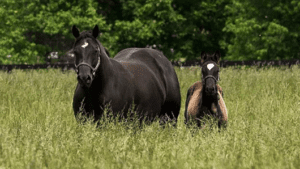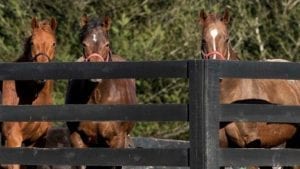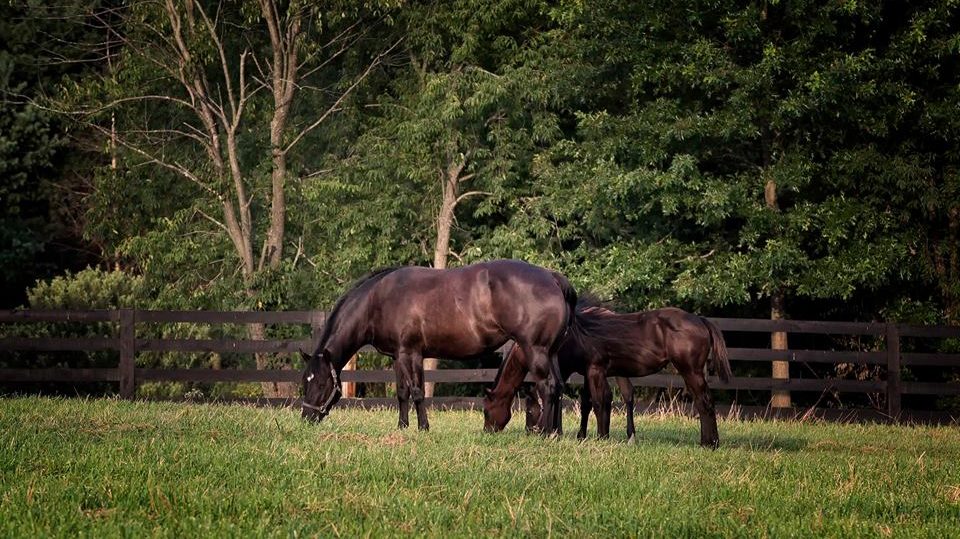GoHorseShow is continuing our series about breeding mares in part 2 of our 2-part series, where top breeding experts Amy Gumz (Gumz Farms), Gary Trubee (Masterson Farms, LLC), and Debbi Trubee (North Farm) go into more in-depth analysis of the factors you should consider before breeding your mare.
Click here if you missed part 1, where our experts covered conformation, pedigree, and produce record.
Movement:
When assessing the quality of a mare’s movement, Amy looks for a “strong shoulder and steady topline.” She admits that “many broodmares are not sound, so you need to be forgiving in some ways.” She looks for overall rhythm, which can often be seen, even if the mare is unsound or lame.
 Debbi agrees that it can be difficult to assess some broodmare candidates’ movement because many mares are no longer sound due to injury. This is another reason she emphasizes conformation, as it is a vital indicator of the mare’s quality and the former quality of movement.
Debbi agrees that it can be difficult to assess some broodmare candidates’ movement because many mares are no longer sound due to injury. This is another reason she emphasizes conformation, as it is a vital indicator of the mare’s quality and the former quality of movement.
Debbi likes to watch the mares moving naturally (without a rider), as riders can manipulate movement to an extent. She believes a lot can be learned, even from the animal’s walk, saying, “If they walk and point their toes, swing from the shoulders, and travel with a flat knee, you can feel pretty confident their movement at the jog and lope were quality in their younger, sounder years.”
Temperament:
Gary looks for broo dmares that are quiet and intelligent with a kind eye. He believes this serves two essential purposes: (1) she will be a model citizen for her foal to learn from, and (2) she will likely pass on a good temperament to help her offspring succeed.
dmares that are quiet and intelligent with a kind eye. He believes this serves two essential purposes: (1) she will be a model citizen for her foal to learn from, and (2) she will likely pass on a good temperament to help her offspring succeed.
Gary has found that if a mare is uncooperative, she will teach her foal to be uncooperative. Foals out of friendly, easy-going mares tend to be easier to handle and train from the beginning, setting them up for a quicker sale and hopefully, future success with their trainer.
Amy also believes that the mare’s temperament will significantly impact the resulting foal because they tend to mimic their mother’s behavior. But, she adds, “A recipient or natural carry mare will influence the babies’ behavior and disposition – for the better or worse.”
Amy’s ideal disposition is that of a “nurturing mare that will still discipline her foal.” A quiet mare that is easy to handle and allows people to take the foal without becoming protective or stressed is a tremendous asset to the breeding process.
Free of Genetic Disease:
All of our experts recommend getting a prospective broodmare tested for genetic diseases. This becomes even more important when breeding a stallion that carries a genetic marker (like HERDA or OLWS), as breeding another carrier to them could be catastrophic. Indeed, not all carriers show physical signs of what could be hidden in the genes, so it is better to be safe than sorry and get the mare tested.
Gary cites the adage, “Knowledge is power,” for the breeding game. Therefore, genetic testing is a crucial piece of information for determining the fitness and quality of any breeding animal.
Purpose for Breeding:

The most subjective, but perhaps the most critical component of selecting a broodmare is determining what you are hoping she will produce. Our experts all agree that you cannot breed a barrel racing mare to a top pleasure stallion and expect either a pleasure horse or a barrel horse.
Determining whether a mare is fit for breeding depends in many ways on what type of foal you are looking to produce. While considerations of conformation, pedigree, produce record, movement, temperament, and genetics are relevant to every discipline, what would be considered desirable in each of those categories varies greatly.
***
 Once you have determined that your mare is worthy of breeding, our experts advise that you have a licensed veterinarian examine her reproductive condition to ensure there are no issues that would inhibit her ability to become and remain pregnant.
Once you have determined that your mare is worthy of breeding, our experts advise that you have a licensed veterinarian examine her reproductive condition to ensure there are no issues that would inhibit her ability to become and remain pregnant.
Our industry experts emphasize that just as much time and research should be invested in selecting the right mare for breeding as is put into stallion selection. They all recommend you choose a stallion to build on your mare’s strengths, improve on her weaknesses, and work with her to give you your dream foal. Breeding will always be a bit of a gamble, but investing in the right mare will help you hedge your bets.







